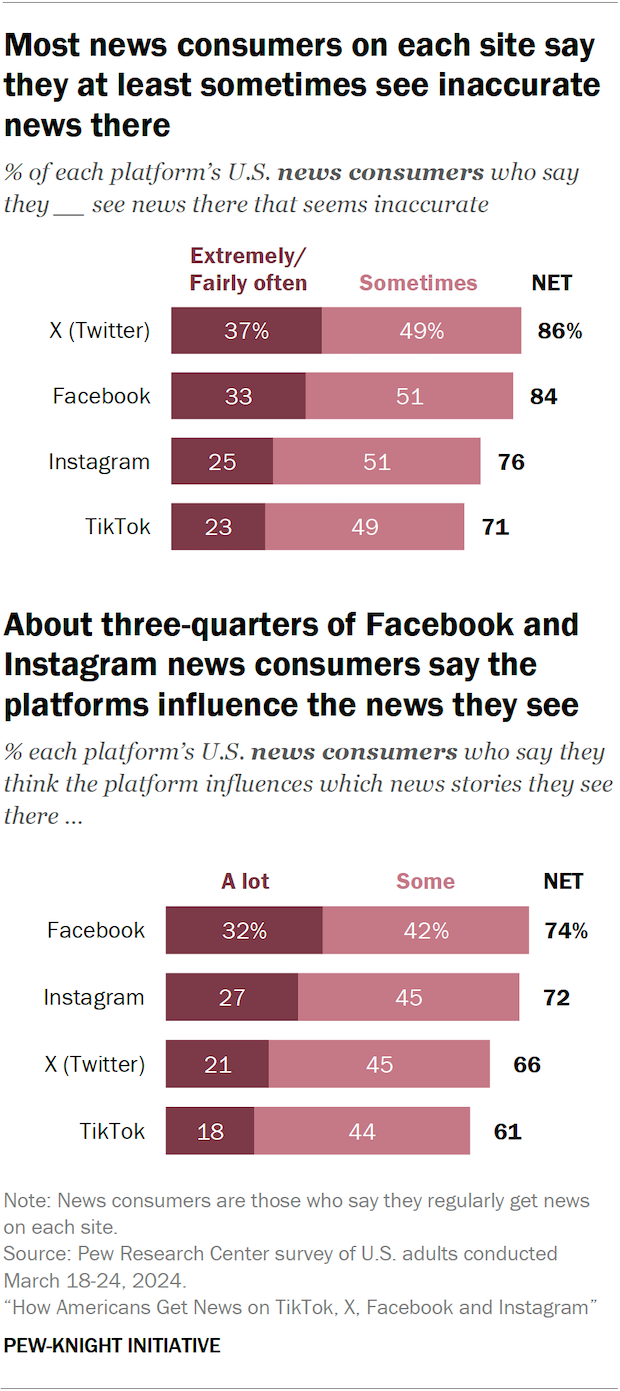☀️ Happy Thursday! The Briefing is your guide to the world of news and information. Sign up here!
In today’s email:
- Featured story: Trump speaks to National Association of Black Journalists
- In other news: Russia releases journalist Evan Gershkovich in prisoner swap with the U.S.
- Looking ahead: Russia counting on unaware Americans to spread election disinformation, U.S. officials say
- Chart of the week: Most people who get news on four major social media sites say they at least sometimes see inaccurate news there
🔥 Featured story
Former President Donald Trump spoke at the National Association of Black Journalists’ convention in Chicago this week as he seeks to improve his standing with Black voters ahead of the November presidential election. Even before his comments during a combative Q&A, his appearance had sparked mixed reactions from NABJ members. Some opposed giving Trump a platform, while others embraced the opportunity to ask him questions.
In an April survey, half of Black Americans said they were following news about the candidates for the presidential election very or fairly closely, with 15% saying they were following this very closely. And journalists are the most common source of political and election news for Black Americans: 54% of Black adults say that they get most of their political and election news from journalists and news organizations, far more than the 13% who say they get most of their news from the next-most common source, friends and family.
📌 In other news
- Russia releases journalist Evan Gershkovich in prisoner swap with the U.S.
- Washington Post CEO accused of deceiving police in UK hacking case
- Two Al Jazeera staffers killed by an Israeli strike in Gaza, bringing the journalist death toll to at least 113 since October 2023
- Norah O’Donnell to step down as anchor of CBS Evening News after 2024 election
- Media company Noisy Creek buys two alt-weeklies in the Pacific Northwest
- A look at amaBunghane’s impact on investigative journalism in South Africa
- Russian court fines Google $50.8 million after failing to remove “fake” information about Russia-Ukraine war
- How Viktor Orbán and his right-wing Fidesz party built a “media empire”
📅 Looking ahead
Russia is looking to use Americans to spread disinformation about the U.S. presidential race without their knowledge, according to U.S. intelligence officials. In a briefing with journalists, an official warned that Americans could be exposed to foreign propaganda online that appears to be from domestic sources, and said the disinformation can focus on candidates, voting or issues such as immigration and crime.
According to a Pew Research Center survey conducted during the last presidential election campaign in 2020, three-quarters of U.S. adults said it was very (44%) or somewhat (31%) likely that Russia or other foreign governments would attempt to influence that election. Among those who said foreign interference was at least somewhat likely, 62% considered it a major problem. Democrats were about twice as likely as Republicans to view foreign attempts to influence the election as a major problem (78% vs. 37%).
📊 Chart of the week
This week’s chart comes from a Center study conducted in March 2024 on how Americans get news on TikTok, X, Facebook and Instagram. Most people who get news on each of these platforms studied say they at least sometimes see news there that seems inaccurate. News consumers on X (37%) and Facebook (33%) are the most likely to say they often see news that seems inaccurate.
News consumers on each site also largely think that social media platforms are influencing which news stories they see there, to at least some extent.

👋 That’s all for this week.
The Briefing is compiled by Pew Research Center staff, including Naomi Forman-Katz, Jacob Liedke, Sarah Naseer, Christopher St. Aubin, Luxuan Wang and Emily Tomasik. It is edited by Katerina Eva Matsa, Michael Lipka and Mark Jurkowitz, and copy edited by Anna Jackson.
Do you like this newsletter? Email us at journalism@pewresearch.org or fill out this two-question survey to tell us what you think.